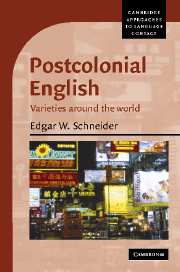Book contents
- Frontmatter
- Contents
- List of maps, figures, and tables
- Series editor's foreword
- Preface and acknowledgments
- List of abbreviations
- 1 Introduction
- 2 Charting the territory: Postcolonial Englishes as a field of linguistic investigation
- 3 The evolution of Postcolonial Englishes: the Dynamic Model
- 4 Linguistic aspects of nativization
- 5 Countries along the cycle: case studies
- 6 The cycle in hindsight: the emergence of American English
- 7 Conclusion
- Notes
- References
- Index of authors
- Index of subjects
Preface and acknowledgments
Published online by Cambridge University Press: 15 December 2009
- Frontmatter
- Contents
- List of maps, figures, and tables
- Series editor's foreword
- Preface and acknowledgments
- List of abbreviations
- 1 Introduction
- 2 Charting the territory: Postcolonial Englishes as a field of linguistic investigation
- 3 The evolution of Postcolonial Englishes: the Dynamic Model
- 4 Linguistic aspects of nativization
- 5 Countries along the cycle: case studies
- 6 The cycle in hindsight: the emergence of American English
- 7 Conclusion
- Notes
- References
- Index of authors
- Index of subjects
Summary
The evolution of Postcolonial Englishes is a most fascinating subject. Having worked on English-language dialectology, sociolinguistics, creolistics, and historical linguistics before, I was fully attracted to this field when I took over the editorship of the journal English World-Wide and the book series Varieties of English Around the World in 1997. The role as an editor is demanding and time-consuming, but it is also a privilege in many ways. It not only forces me to keep up to date with current discussions and writings in the field but it also brings me in touch with colleagues all around the globe, with young scholars with fresh ideas, and with new concepts, perspectives, and data. Luckily, it also provides excellent excuses to travel to all kinds of places, to present my own research and to get first-hand exposure to different language ecologies. So, what I have ended up with is a bird's-eye view of this exciting process of the globalization and, at the same time, local diffusion of English in all of its forms and functions.
It was this perspective that suggested to me that there are more similarities between individual processes of the emergence of indigenized Englishes in various localities than has hitherto been recognized. From there, it is only a short step to the uniformitarian hypothesis that has informed the present book, the claim that there is a single, coherent process which underlies the evolution of Postcolonial Englishes.
- Type
- Chapter
- Information
- Postcolonial EnglishVarieties around the World, pp. xiii - xvPublisher: Cambridge University PressPrint publication year: 2007

